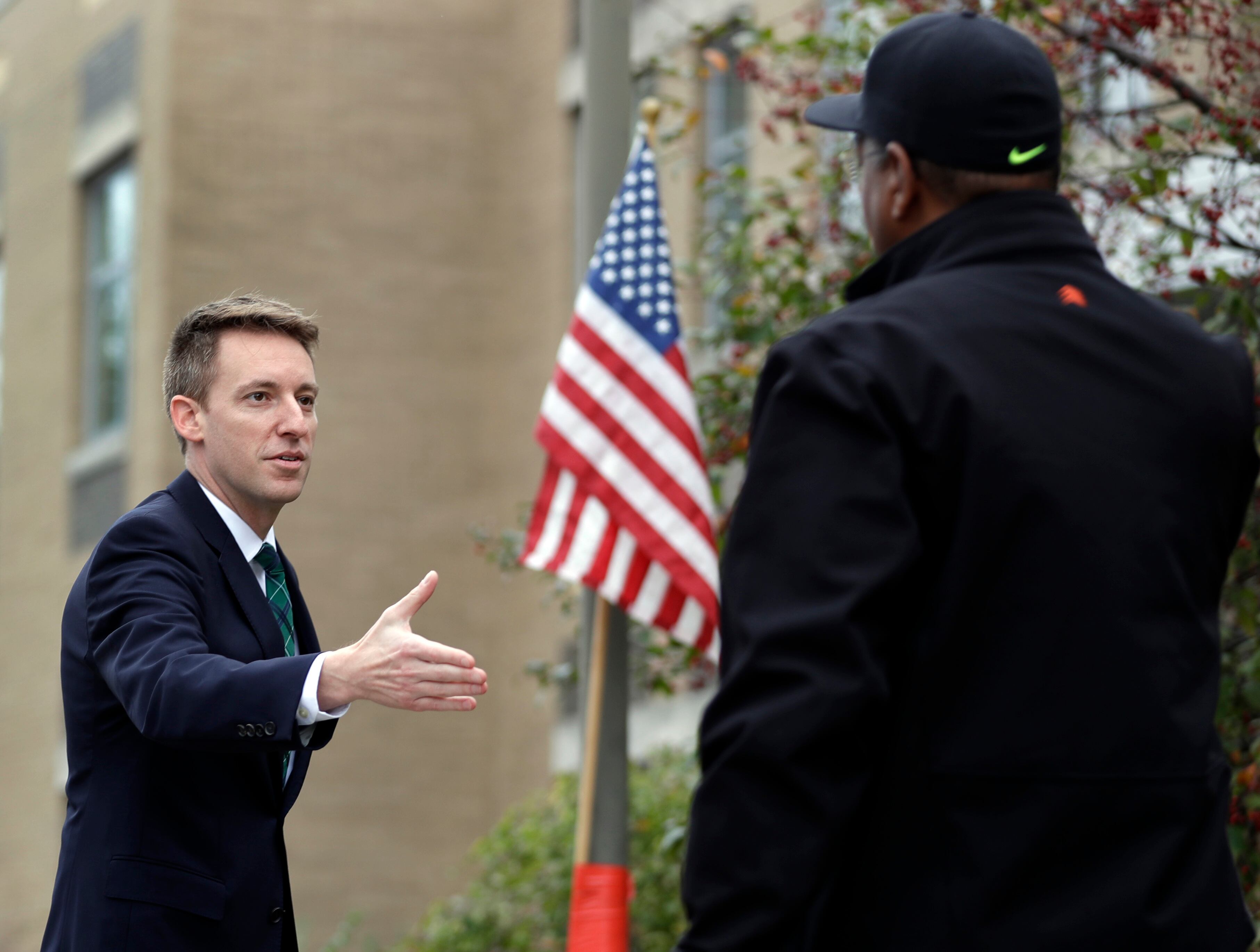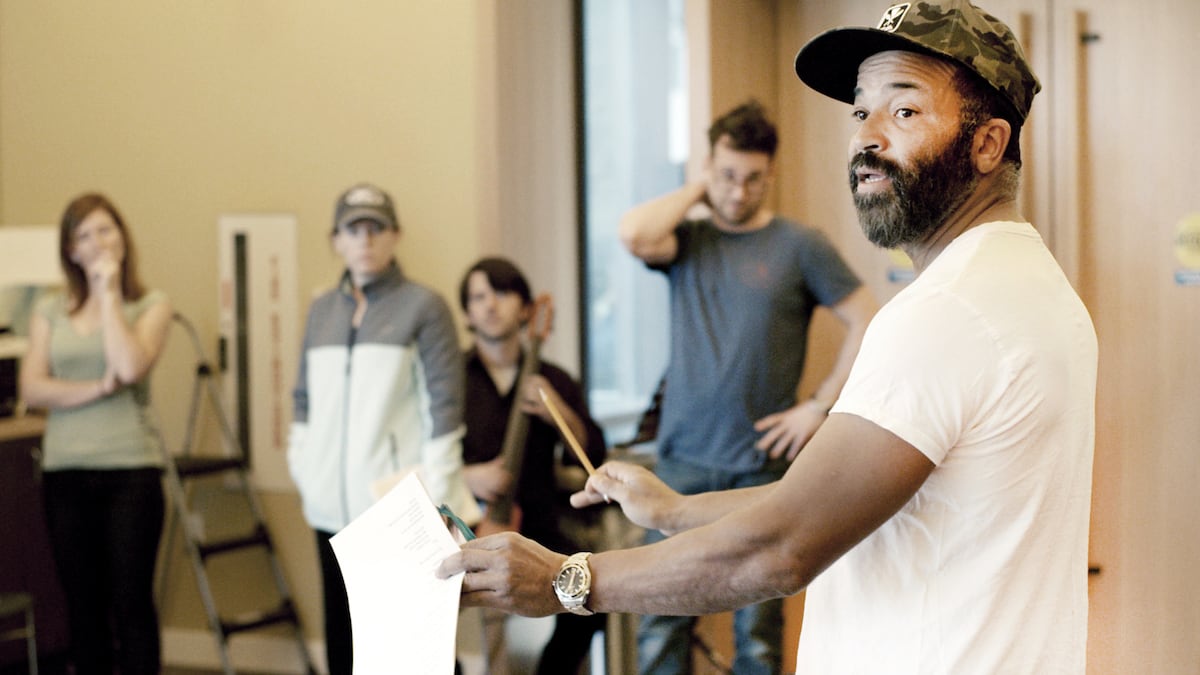KANSAS CITY, Mo. — Not so many months ago, Jason Kander was spending his life on airplanes. The picture of youth and energy, Kander was in demand from Democratic groups across the U.S., a military veteran from middle America making a powerful case for generational change in his party, possibly with an eye toward a 2020 presidential run.
But beneath the swagger, something inside Kander's head weighed on him — nightmares, paranoia, even suicidal thoughts. Like so many veterans, he was carrying the unspoken burden of post-traumatic stress disorder, and suddenly last fall he detailed his personal struggles and dropped from public view .
Now, Kander is re-emerging with a healthier mental state and a new focus on helping other veterans, leading the national expansion of a program in his hometown of Kansas City, Missouri, called Veterans Community Project. At the same time he’s easing back into the fringes of politics — doing national TV interviews, appearing with Democratic presidential hopeful Pete Buttigieg during the candidate’s visit to Kansas City (though he hasn’t endorsed any specific candidate), and talking candidly about his experience reconciling trauma, healing and political ambition.
"I feel the best I've felt in a very, very long time," Kander told The Associated Press. "I'm really enjoying life."
RELATED

Kander, 38, spent about four months as an Army intelligence officer in Afghanistan in late 2006 and early 2007. He said his duties often left him isolated and alone with just a translator, sometimes in rooms with people "who presented a potential threat, and not knowing if I was going to get out of those rooms."
Soon after his deployment he began suffering troubling symptoms — the sadness, the anxiety, the constant looking over the shoulder for enemies who weren't there.
"I can tell you that for a long time, what I told myself was that because there hadn't been the stereotypical singular, traumatic event, I couldn't possibly have earned the right to call it post-traumatic stress," he said.
He brushed aside any mental health concerns during a fast political ascent.
Kander was just 27 when he was elected to the Missouri House in 2008. Four years later, he was elected Missouri secretary of state.
It was his 2016 run for the Senate that caught the eye of national political observers, thanks in part to a stunning ad in which he assembled a rifle blindfolded while discussing his support for background checks for gun owners. At campaign events, he spoke often about his military career and called for a new generation of leadership in Washington.
It almost worked. Kander lost by less than 3 percentage points to incumbent Republican Roy Blunt in increasingly conservative Missouri, a state Donald Trump carried by 19 percentage points in the presidential race.
A future run for president, perhaps in 2020, wasn't far-fetched. Asked on his last day in office about a rising Democratic star, former President Barack Obama replied, "My guy in Missouri. Kander."
So it was surprising when, in June 2018, Kander announced he was running for Kansas City mayor. He now says it was, in part, acknowledgement that "something was not right."
"My plan was to come home, become mayor and serve my neighbors and my community and I thought that would have a redemptive quality to it," Kander said. "But I also thought I was going to come home and have treatment at the VA."
But as he campaigned last year, Kander failed to seek help "for the same reasons I hadn't in the past — I was worried about the stigma, I was worried about how it would affect my political career. That just allowed things to get much, much worse," he said.
One night, things got so bad that he phoned a suicide hotline for veterans. Days later, on Oct. 2, he dropped out of the race with a statement acknowledging his PTSD.
RELATED

For several months, Kander dealt with his issues quietly. He began weekly counseling sessions at the VA, including therapy that involved talking at length about the trauma until "you get to the point where you don't feel like you're re-experiencing it each time." He confronted behaviors that had become all too common, such as how he couldn't sit in a restaurant with his back to the door.
The therapy began to work. The weekly counseling sessions became monthly, then every six weeks. "Now, it's sort of informally, every couple of months," Kander said.
Retired Army Lt. Col. Jim Craig, coordinator of the University of Missouri-St. Louis' Veteran Studies program, said Kander's progress is a testament to the therapies developed at the VA over the past decade.
"This is a public figure we've seen going into therapy and come out of therapy on the back end, fully functioning and ready to go," Craig said.
Kander’s involvement with Veterans Community Project began as a client. Even with a law degree and years of government experience, he was “a little bit overwhelmed” by the confusing maze of paperwork and bureaucracy as he sought help through the VA. He turned to the group’s outreach center, which matches veterans with needed services at no charge.
Soon, he was volunteering there. The project's co-founder and CEO Bryan Meyer said that when the organization decided to go national, Kander, who founded the voting rights group Let America Vote in 2017, was a natural choice.
"Jason just brings a whole lot of experience when it comes to building and running a large organization, and a whole lot of experience in government and politics," Meyer said. "When you combine that with the fact that he also has the passion and the experience of him going through some of these struggles himself, this makes a perfect individual to bring on board."
The program will expand to eight cities by 2022 and eventually others, Kander said. In addition to the outreach center, the group provides rent-free temporary housing in a tiny homes village.
Kander isn't ruling out an eventual return to politics, but not in the near future, including 2020.
"Obviously my opinion about the direction of the country, my opinion about the president has not changed, so there will be times when I speak up and say what I think," Kander said. "But I don't have any thoughts about running for office right now."
RELATED

If he runs for office again, Kander's honesty in confronting his PTSD will make him even more electable, said Patrick Murphy, an Iraq War veteran who served as a Democratic congressman from Pennsylvania and undersecretary of the Army under Obama.
"I think the American people want authentic leaders," Murphy said. "Jason Kander is not just a combat veteran but he's an inspirational and authentic leader who has a lot to offer in political public service."
Kander refers to PTSD as an "injury," one that he knows he'll always have to deal with.
"It's no different than any other injury," Kander said. "It's not like it's cured or ever goes away. But you learn how to treat it and you make sure that it's no longer disruptive to your life."
Salter reported from St. Louis.





